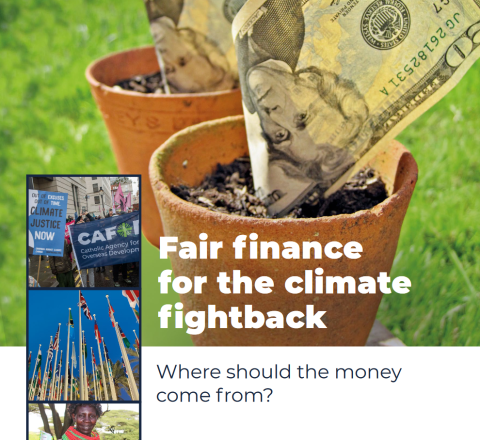
The preparatory conference for COP 29, held in Bonn, Germany, stalled over questions of financing.
The following article was published in the July-August 2024 issue of NewsNotes.
Representatives from most of the world’s nations gathered in Bonn, Germany, in June to prepare for the UN Climate Change Conference COP 29 to held in Azerbaijan in November.
Already, COP 29 is being called the Finance COP – its focus to be the question of just how the world will finance the actions needed to deter climate change. The Bonn meeting was testimony to that focus and saw a flurry of country negotiators, climate scientists, activists, academics and faith groups working around the clock to shape, argue and hammer out possible solutions.
It is becoming increasingly evident that the global transition away from fossil fuels – an agreement made at COP 28 – will require massive infusions of funds, and fast. The Intergovernmental Panel on Climate Change (IPCC) estimates that the world has only about six years to avoid cataclysmic climate disasters. Just how much money is needed for that transition, where that money will come from and how it will be directed were the burning questions at Bonn.
The new tongue-twisting buzz word at the Bonn conference was the acronym NCQG—the New Collective Quantified Goal, or the global pot of money needed for a just energy transition. A wide division of positions was reflected in the negotiating. Some Global South negotiating blocks named figures between 1 and 1.3 trillion. Climate justice networks called for 5 trillion. Others refused to pin a specific sum. Developed nations stuck to a definition of only “more than $100 billion” (the previous annual sum that was set in 2009).
“The cost of inaction—if we don’t spend those trillions—just far exceeds the seed money we’re putting in,” said Michai Robertson, the lead finance negotiator for small island, at a press conference in Bonn. For those wondering if this kind of sum is even possible, he also noted that war and conflict “get trillions already.”
The discussions on the NCQG led to a clear division between developing nations and donor nations. Developing countries—that have done little to contribute to the cause of climate change but suffer its gravest consequences—demanded that the new goal be made up of public grants from the nations whose historic greenhouse gas emissions have created this existential planetary crisis. Currently, much of “climate finance” comes in the form of loans, flipping the flow of global funds from the poor to the rich, forcing poor nations to choose between climate action or addressing basic needs of their population. Donor countries pushed back. Their rallying call was the expansion of the contributor base to allow for more funds to enter the pot. They argued that the UN categories of “developed” and “developing” countries was far outdated, having been set in 1992. Since then, some “developing” nations (such as China, Saudi Arabia, South Korea) have grown much richer and more polluting and therefore should contribute to climate finance and not receive it.
As is often the case at these global gatherings, new ideas percolate from the sidelines. Several sideline events were focused on uncovering the sources of necessary finance. One of these was an event titled “Why Innovative Sources of Public Finance and Financial System Reform Matter: A Moral Case,” sponsored by the Maryknoll Sisters, Caritas International, CAFOD, CIDSE, and KOO, with an introduction by the lead negotiator of the Holy See delegation.
The panel of experts argued that the money needed for the urgent energy transition simply cannot be reached without unlocking new public sources of funds. These funds must come from the polluting countries and companies that have caused this crisis and profited from the burning of fossil fuels for two centuries. Specifically, these funds could be made available by:
- Fixing the broken global tax architecture,
- Resolving the new global sovereign debt crisis, and
- Reforming International Financial Institutions.
Global momentum is already building on these three fronts in anticipation of COP 29.
The NCQG debate ended with some agreements on access, transparency, and debt sustainability. Dialogue will continue in October in hopes of bringing a concrete proposal to COP 29. What became clear in Bonn is that a real breakthrough in climate finance—the enabler of climate action—must happen if the world is to get on track to meet its 1.5 degrees Celsius target.
Cover image of report on climate funding from CAFOD via CIDSE.
